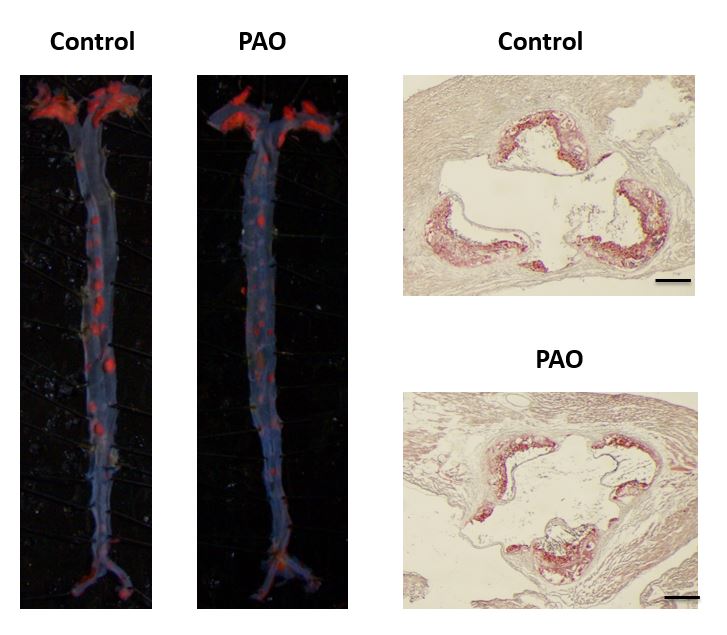Although fats are known for their bad health effects, this is not true of all fats; certain lipids that your body makes may in fact be good for you. A new study from the laboratory of Asst. Prof. Ebru Erbay, of the Department of Molecular Biology and Genetics and UNAM (Institute of Materials Science and Nanotechnology), that has been published in Science Translational Medicine shows that a lipid with unusual physiological effects that is made by our bodies can prevent atherosclerosis (hardening of the arteries) when supplied orally over the long term.
 A monounsaturated fatty acid, palmitoleate (PAO), has been previously associated with improved insulin sensitivity in mice and humans. PAO is not found ubiquitously in most common food sources. However, it can be made by de novo lipogenesis (DNL) in adipocytes and liver. Because DNL and PAO levels increase in obesity and in patients with fatty liver and insulin resistance, it has been incorrectly associated with these disease states. However, previous studies in mice showed that adipose-tissue derived PAO can have important metabolic impact on distant organs; for example, it can improve insulin sensitivity and glucose uptake in muscle while suppressing lipid biogenesis in liver. These studies clearly show PAO has important physiological effects, however, how it operates remained a mystery. In the new study, the lipidomic analysis of tissues obtained from dyslipidemic mice showed that orally delivered PAO enters the cells and integrates into the membranes of intracellular organelles. The dynamic membrane remodeling of a particular organelle, the endoplasmic reticulum (ER), by oral PAO intake had a remarkable impact on the organelle’s functioning. In these mice, the remodeled ER became resilient to stress induced by dyslipidemia. It is known that ER stress contributes to activation of the inflamnasome, a multi-protein complex, which processes a pro-atherogenic cytokine, IL-1 beta, into its mature, secreted form. Activation of the inflammasome and IL-1 beta has been causally associated with atherosclerosis as well as insulin resistance and diabetes. Researchers showed that PAO also abolished the activation of inflammasome and suppressed IL-1 beta in circulation and atherosclerotic plaques. The study findings provide an example of dietary manipulation that can reduce metabolic stress, largely felt at the level of our organelles, and prevent inflammation that drives atherosclerosis.
A monounsaturated fatty acid, palmitoleate (PAO), has been previously associated with improved insulin sensitivity in mice and humans. PAO is not found ubiquitously in most common food sources. However, it can be made by de novo lipogenesis (DNL) in adipocytes and liver. Because DNL and PAO levels increase in obesity and in patients with fatty liver and insulin resistance, it has been incorrectly associated with these disease states. However, previous studies in mice showed that adipose-tissue derived PAO can have important metabolic impact on distant organs; for example, it can improve insulin sensitivity and glucose uptake in muscle while suppressing lipid biogenesis in liver. These studies clearly show PAO has important physiological effects, however, how it operates remained a mystery. In the new study, the lipidomic analysis of tissues obtained from dyslipidemic mice showed that orally delivered PAO enters the cells and integrates into the membranes of intracellular organelles. The dynamic membrane remodeling of a particular organelle, the endoplasmic reticulum (ER), by oral PAO intake had a remarkable impact on the organelle’s functioning. In these mice, the remodeled ER became resilient to stress induced by dyslipidemia. It is known that ER stress contributes to activation of the inflamnasome, a multi-protein complex, which processes a pro-atherogenic cytokine, IL-1 beta, into its mature, secreted form. Activation of the inflammasome and IL-1 beta has been causally associated with atherosclerosis as well as insulin resistance and diabetes. Researchers showed that PAO also abolished the activation of inflammasome and suppressed IL-1 beta in circulation and atherosclerotic plaques. The study findings provide an example of dietary manipulation that can reduce metabolic stress, largely felt at the level of our organelles, and prevent inflammation that drives atherosclerosis.

Erbay’s team: Begüm Kocatürk, Buket Gültekin, Özlem Tufanlı, İnci Onat, Ebru Erbay, İsmail Çimen, Onur Apaydın, Pelin Telkoparan
Harvard Magazine: http://www.harvardmagazine.com/2016/09/good-fat-fights-bad
Prevention of Atherosclerosis by Bioactive Palmitoleate Through Suppression of Organelle Stress and Inflammasome Activation
Authors: Ismail Çimen1.2, Begüm Kocatürk1,2, Seda Koyuncu1, Özlem Tufanlı1.2, Umut I. Onat1.2, Aslı D. Yildirim1,2, Onur Apaydın1,2, Şeyma Demirsoy1 Zaliha G. Aykut1, Uyen T. Nguyen3, Steven M. Watkins3, Gökhan S. Hotamışlıgil4, Ebru Erbay1,2*
Affiliations:
1 Department of Molecular Biology and Genetics, Bilkent University, Ankara 06800, Turkey
2 National Nanotechnology Center, Bilkent University, Ankara 06800, Turkey
3 Metabolon, Sacramento, CA 95691, USA
4 Department of Genetic and Complex Diseases and Sabri Ülker Center, Harvard T.H. Chan School of Public Health, Boston, MA 02115USA
*To whom correspondence should be addressed